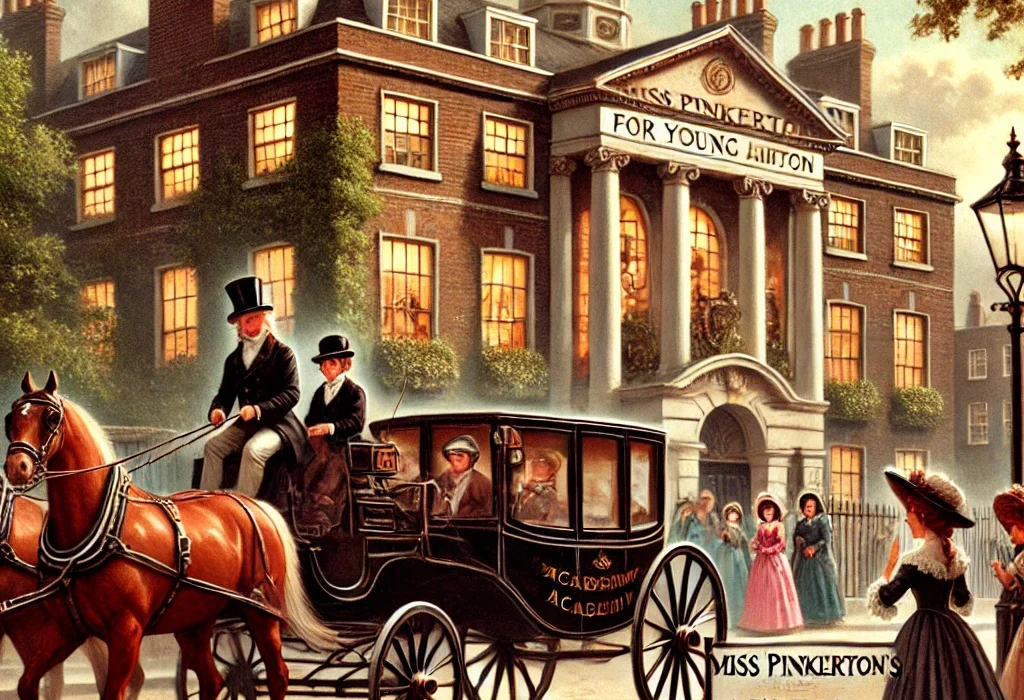Vanity Fair is a novel by William Makepeace Thackeray, first published in 1848 as a serialized story. Set during the Napoleonic Wars, the novel is a biting social satire that chronicles the lives of various characters as they navigate the English class system. Subtitled A Novel Without a Hero, it presents a world driven by ambition, materialism, and hypocrisy, where individuals rise or fall in society based on their cunning or fortune. Thackeray’s story centers on two women, Becky Sharp and Amelia Sedley, whose contrasting personalities and fortunes make them focal points of the narrative.
Comprehensive Plot Summary
On a bright morning in June, a grand family coach arrives at Miss Pinkerton’s academy for young ladies in Chiswick. The coach is there to collect two girls, Amelia Sedley and Becky Sharp. Amelia is the daughter of a wealthy London merchant, sweet and gentle, loved by all. Becky, however, is different. She is clever, ambitious, and determined to escape the poverty she was born into. As they depart, Becky tosses aside the dictionary that Miss Pinkerton had intended as a parting gift, marking the beginning of her defiant quest for social ascendancy.
Amelia returns to her loving family, where she eagerly awaits the arrival of her fiancé, George Osborne. Her brother Joseph, recently returned from India, is also present. Becky, ever calculating, sees an opportunity to secure her future and begins to charm Joseph, with hopes of becoming his wife. But Joseph is shy and awkward, and when George discourages the match, Joseph withdraws in embarrassment.
Amelia’s life is charmed—until her father’s financial ruin strikes like a thunderclap. The Osborne family, who had previously welcomed the engagement between George and Amelia, now forbids the marriage, seeing no future in a match with a penniless girl. George, headstrong and indulgent, defies his father and marries Amelia in secret. The young couple, along with George’s friend William Dobbin, travel to Europe, where the shadow of Napoleon’s advancing forces looms.
Meanwhile, Becky Sharp has been busy securing her future in her own way. She becomes a governess for the Crawley family, where she quickly ingratiates herself with Sir Pitt Crawley, a rich but coarse nobleman. When Sir Pitt proposes marriage, Becky astonishes him by revealing that she is already married—to his son, Rawdon Crawley, a charming but reckless soldier. The marriage infuriates Lady Crawley, but Becky is undeterred. She has her sights set on greater things.
Becky and Rawdon move to London, where they live a glamorous, extravagant life. Becky becomes a favorite in high society, charming the rich and powerful with her wit and beauty. But despite her success, she is always in search of more—more wealth, more influence, more status. Her ambitions know no bounds, and she manipulates those around her with little regard for their feelings or well-being.
As George, Amelia, and Dobbin settle into their new life abroad, war breaks out. The men are called to the battlefield, leaving their wives behind. George, ever the flirt, is drawn to Becky Sharp, who has also found her way to Brussels. Despite his marriage to Amelia, George is captivated by Becky’s charm. It is a dangerous flirtation, one that sparks jealousy and tension. But before any real scandal can erupt, George is killed at the Battle of Waterloo.
Amelia is devastated. Her world crumbles around her, and she is left to raise her infant son alone. Dobbin, who has long been in love with her, remains steadfast by her side, though his feelings remain unspoken. He cares for her and her son, providing quiet, loyal support. But Amelia, blinded by her grief and loyalty to George’s memory, does not notice his devotion.
Back in London, Becky and Rawdon’s fortunes begin to decline. Despite her charm, Becky’s manipulations catch up with her. Her extravagant lifestyle leads them into debt, and their relationship strains under the weight of financial ruin. Rawdon, once blind to his wife’s schemes, begins to see through her façade. His breaking point comes when he discovers her in a compromising situation with the wealthy and powerful Lord Steyne. Enraged, Rawdon leaves her, taking their son with him. Becky, once the toast of London, is now disgraced and alone.
Years pass, and Amelia continues to live in quiet sorrow, still mourning George. Dobbin, ever patient, watches over her. But even he grows weary of her devotion to a man who had been unworthy of her love. At last, Dobbin confronts Amelia, urging her to move forward and see the truth about George’s failings. It is a painful moment, but one that opens Amelia’s eyes. Slowly, she begins to let go of her idealized memory of George and finally recognizes Dobbin’s love.
Meanwhile, Becky Sharp, ever resourceful, manages to survive despite her fall from grace. She drifts through Europe, using her wit and charm to stay afloat. At one point, she encounters Joseph Sedley again. With her usual cunning, she rekindles their acquaintance, playing the role of the downtrodden but dignified woman. Joseph, easily charmed, falls under her spell once more.
In the end, Becky’s fate is left uncertain. She remains an enigma, a woman who survived through wit and manipulation but never found true contentment. Amelia, on the other hand, finds peace with Dobbin, realizing that true love had been by her side all along. Though Vanity Fair—a world of deceit, ambition, and vanity—continues to spin, some, like Amelia and Dobbin, manage to find their way through the chaos to something real and lasting
Main Characters
Becky Sharp: The novel’s anti-heroine, Becky is sharp, manipulative, and resourceful. Coming from a poor background, she uses her wit and charm to climb the social ladder. She is unapologetically self-serving but also undeniably captivating, representing the ruthless ambition of those trying to succeed in a rigid class system.
Amelia Sedley: In stark contrast to Becky, Amelia is gentle, kind-hearted, and passive. Born into a comfortable middle-class family, her fortunes change drastically throughout the novel. Amelia’s loyalty and love for George Osborne define much of her character arc, but her naivety and selflessness often leave her vulnerable.
George Osborne: Amelia’s love interest and eventual husband, George is vain and selfish. He marries Amelia despite family disapproval but is unfaithful and neglectful. His character illustrates the empty vanity of the upper classes.
William Dobbin: A humble and loyal army officer, Dobbin is secretly in love with Amelia throughout the story. His unwavering devotion contrasts sharply with George Osborne’s fickleness, making him one of the few genuinely honorable characters.
Rawdon Crawley: Becky Sharp’s husband, Rawdon is a gambler and soldier, largely led by his emotions. He is initially charmed by Becky’s vivacity, but their marriage grows strained as her ambitions overshadow their relationship.
Sir Pitt Crawley: Rawdon’s wealthy but miserly and corrupt uncle, Sir Pitt represents the decaying aristocracy. His eccentricities and crude behavior are satirical portraits of the declining morals of the ruling class.
Themes and Motifs
Social Mobility and Ambition: A central theme of Vanity Fair is the desire for upward social mobility. Becky Sharp embodies the hunger for power and prestige, using her intelligence and charm to rise through society. Her relentless ambition, however, contrasts with characters like Amelia, who remain confined by social conventions and personal loyalty.
Hypocrisy and Vanity: Thackeray mercilessly exposes the hypocrisy of 19th-century British society. The title, Vanity Fair, refers to a world driven by superficiality, where wealth, status, and appearance take precedence over moral integrity. The characters’ vanity leads them to make foolish decisions, whether it’s George Osborne’s pride, Becky’s ambition, or Amelia’s blind devotion.
The Futility of War: Set against the backdrop of the Napoleonic Wars, the novel questions the purpose and value of war. Thackeray does not glorify battle but instead highlights its destructiveness and the suffering it causes. Characters like George and Rawdon are swept up in the pomp of military life, but war ultimately serves as a backdrop to their personal struggles rather than a noble cause.
Marriage and Gender Roles: Vanity Fair scrutinizes the institution of marriage, particularly as it relates to women’s limited roles in society. Characters like Becky Sharp use marriage as a tool for social advancement, while others like Amelia are trapped in traditional roles of subservience. The novel portrays marriage less as a romantic ideal and more as a reflection of economic and social convenience.
Writing Style and Tone
Thackeray’s writing style in Vanity Fair is both satirical and realist. He frequently addresses the reader directly, breaking the fourth wall to comment on the actions of his characters or the absurdity of society. This self-awareness gives the novel a playful yet cynical tone, emphasizing the ridiculousness of the world he portrays. Thackeray’s prose is rich with irony, and his sharp observations skewering the pretensions of the upper classes give the novel its biting wit.
In terms of structure, the novel often reads like a moral fable, with characters serving as representations of broader human vices or virtues. Yet, despite its moral undertones, Thackeray avoids overt moralizing. Instead, he allows his characters’ flaws and virtues to speak for themselves, showing how the pursuit of wealth and status often leads to hollow success.
The tone of Vanity Fair shifts between light-hearted humor and a more somber, reflective mood. While the novel is filled with lively, almost theatrical scenes, there is an undercurrent of melancholy as Thackeray reveals the emptiness behind the glittering facade of society. His language is intricate, filled with detailed descriptions, and he employs satire to illustrate the follies of his characters. Despite the often farcical nature of the plot, there is a deep sense of moral reflection in Thackeray’s portrayal of human ambition and folly.
We hope that this summary has sparked your interest and would appreciate you subscribing to our newsletter.
There’s a treasure trove of other fascinating book summaries waiting for you. Check out our collection of stories that inspire, thrill, and provoke thought, just like this one by clicking here.
Remember, while our summaries capture the essence, they can never replace the full experience of reading the book. If this summary intrigued you, consider diving into the complete story – buy the book and immerse yourself in the author’s original work.
If you want to request a book summary, click here.
When Saurabh is not working/watching movies/reading books/traveling, you can reach him via Twitter/X, or LinkedIn.
Restart reading!






